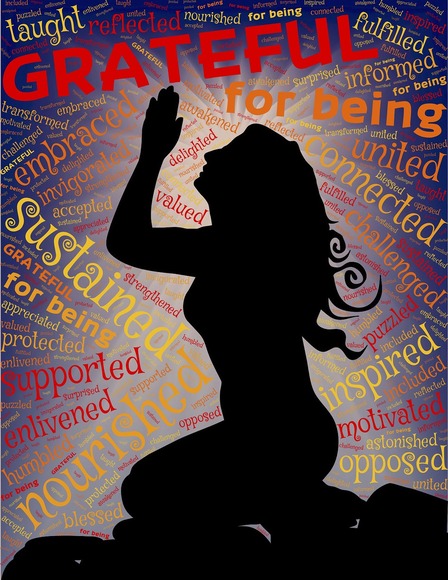There are many definitions of gratitude. Most of them describe this emotion as an appreciation for what we receive from others. However, such a view is somewhat narrow in the context of the actual topic of this article.
Viewed more broadly, gratefulness is related not only to receiving help, gifts, or praises from other people, but to a state of appreciation for our own deeds, traits, and accomplishments. Through gratitude, we learn to appreciate all we have already become and what we achieved in life. Gratitude emphasizes goodness. When we are grateful, we focus on who we are and what we have achieved, rather than always putting most of our attention to numerous negativities in our life. What are the benefits of gratitude? No doubt, gratitude is one of the most beneficial states of being. As a personal growth practice, its effects are powerful and profound, and are similar to those of meditation, mindfulness, prayer, yoga, and forgiveness. There is plenty of scientific research that strongly confirms the numerous and somewhat surprising benefits of gratitude. Regularly practiced, it will have a huge, positive impact on our personality. It will significantly improve our emotional and social life, career, and health. Concretely, this emotion:
Indeed, plenty of reasons to be grateful! Through gratitude, we learn to appreciate all we have already become and what we achieved in life. 
Image by Alfonso Cerezo from Pixabay
How to practice gratitude?
There are so many ways to do this practice. The key is, of course, to incite the very feeling of gratefulness as strongly and deeply as possible, using various techniques and approaches. For example, every morning (after getting up) and evening (before sleep), you may think of three to five concrete things that you are grateful for. You may be thankful for small things that make you happy at the moment, like a morning cup of coffee, or your child’s hug. You could feel gratitude for some of your basic aspects of life, like your very existence, body, having eyesight, the beating heart, breath, two hands and two legs, being healthy, aware, and sane. Or, you can be appreciative for your children, family, relationships, spiritual practice, romantic love, wealth, accomplishments, education, creativity, ability to deeply love and feel compassion, good habits, and so on. It is also a good idea to put on paper all your reasons for gratitude each time you do this practice. Another way of developing the feeling of gratefulness is to follow gratitude prompts. The prompts allow you to identify all the things you are grateful for. You simply have to fill in the blanks. The prompts cover multiple senses, colors, people, and things. The goal is to identify at least three things in each category that you are thankful for. The prompts include:
Or, you can make your own gratitude statements. Here are some examples of such statements: - I’m so grateful for my life (or existence). - Thank you God for keeping me and my family alive and healthy. - Thank you angels for the incessant flow of inspiration I am blessed with. - I'm so thankful to those who love me and accept me for who I am. - I’m grateful for this wonderful cup of coffee. - I’m so thankful for my children’s happiness. - I’m so grateful for my spouse’s smile and laughter. - Thank you, Universe for fulfilling my desire for success. - I feel gratitude for my job and regular salaries. - I am thankful to myself for finishing this project. - Thank you, my dear body, for serving me faithfully all these years. This list could be endless. There are so many reasons for being grateful all the time. To whom should we be grateful?  Image by John Hain from Pixabay Image by John Hain from Pixabay
Yes, sometimes we are wondering to whom we should direct our gratitude. Actually, there are many answers.
If you are a non-believer, you don't have to feel grateful to anyone, just feel this emotion. Or, you can be grateful to yourself for everything you've done. You may be grateful to your family for their support, to some concrete people who helped you in specific areas of your life. You can also feel gratitude to your parents or caregivers, ancestors, all living beings, to the Universe... If you are a religious person, you may feel gratitude to God, Buddha, divine beings, saints, angels, or your spiritual guides. The list is endless. The only really important thing is that you feel gratitude. What about feeling gratitude for bad people? As long as we are living a typical, "normal" life, without consciously taking the responsibility for life, we will experience suffering. There will always be some people or situations that seem to recurrently cause pain. However, our enemies are, in fact, our best teachers. Likewise, we learn the most from adverse events. Gratitude leads to forgiveness. If we are able to feel gratefulness to a person who deeply hurt us, to be thankful for allowing us to deepen our understanding of life, then we are ready to forgive them. And that is a true feat! So, we can be grateful for virtually anything. Even for bad things. However, it’s advisable that you start your gratitude practice with positive things. Concluding thoughts In difficult situations, gratitude offers hope and consolation, a light at the end of the tunnel. It shifts our attention toward another, better side of our life circumstances. In a way, it makes us whole again. On the other hand, whenever we feel happiness, gratitude will enrich it with a deeper and more grounded sense of joy. Practiced consistently, gratitude cultivates a very optimistic, joyful, yet grounded view of life. As this mysterious emotion becomes a normal state of our being, we naturally become more humble, compassionate, and resilient. Practicing gratitude alone will surely transform your life. However, the subtle yet powerful benefits of gratefulness are even more obvious if you combine it with other personal development practices. For example, adding journaling, forgiveness, mindfulness, and meditation to your everyday growth work is a great idea.
Happy inner work and have a great day! :-)
1 Comment
26/4/2022 02:30:26
The definitions of these theorys of yours. Because yntill they were intified... they were not a factor of life... least in a good healthy countousness... your ideas take a need for you... not sure how your contousness right now would be of me and my way of thinking i knew alot about contousness foregiving you for your reply....given forgiving myself if i come across as rude ....alit of people take that one over board or the some in depresion. Because they took it overboard and hasnt forgave themselves.
Reply
Leave a Reply. |
Please note that most of the articles have a "Read More" break, which is sometimes hardly visible.
It is located at the bottom of visible part of the article, on the right side. To continue reading the article, click on that link. This page may contain affiliate links meaning we earn a commission if you use those links.
We only recommend pages we appreciate and trust. Archives
March 2023
Categories
All

|
For guest posts or placing ads on our website, please use the contact form on the 'About/Contact Us' page.



 RSS Feed
RSS Feed

